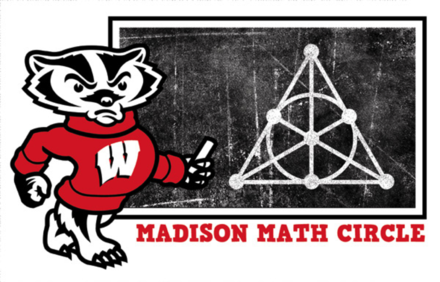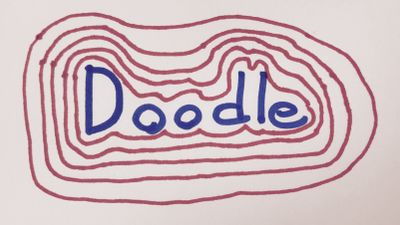Madison Math Circle Abstracts
September 18 2017
| Daniel Erman |
| Title: Welcome to the Madison Math Circle! |
|
Abstract: At the Madison Math Circle, we aim to give a flavor for the creative type of thinking that goes into mathematical research. In this week's interactive activity, students will explore questions related to Mobius strips, developing their own conjectures. |
September 25 2017
| Betsy Stovall |
| Title: Math is a game! |
|
When mathematicians are working to solve a theoretical problem, it often helps to imagine that we are playing a game: What could our opponent do to make our job as difficult as possible, and what is our strategy to defeat them no matter what move they make? In this session, we will try this out by playing several games and trying to come up with winning strategies. |
October 2 2017
| Rachel Davis |
| Title: Thinking outside the box |
|
Abstract: We will try some geometric puzzles related to area, volume, and dimension using techniques such as drawing diagrams, looking at special cases, using symmetry, and changing perspective. |
October 9 2017
| Solly Parenti |
| Title: Hackenbush |
|
Abstract: I come from an alien world where we spend all of our time playing a game called hackenbush. I'd like to introduce y'all to this game so you don't embarass yourself if you come visit my planet. |
October 16 2017
| Mihaela Ifrim |
| Title: Escape of the Clones! |
|
Abstract: We wish to find an invariant (an invariant is a quantity that doesn't change no matter how the process plays out). By playing couple of games will help us find some! The main game we will play is Escape of the Clones! Promise you will like it! |
October 23 2017
| Ryan Julian |
| Title: Recursion for Fun and Profit |
|
Abstract: Beginning with the classic Towers of Hanoi puzzle, we'll explore several puzzles whose solutions can often be found by thinking recursively. We'll also discover how recursion and related methods of simplifying problems can be used to create efficient algorithms to solve a variety of practical problems. |
October 30 2017
| John Wiltshire-Gordon |
| Title: Euler Characteristic |
|
Abstract: The most important invariant associated to a collection of featureless points is their number, which can be found using a process called "counting". We explain a generalization of counting that works for other, more interesting shapes. For example, we will count a circle and a sphere. We recall typical counting arguments, and try to apply them to shapes. |
November 6 2017
| Wanlin Li |
| Title: How to Outsmart a State Test? |
|
Abstract: A common problem in a state test is given a sequence of numbers like 4, 9, 16, 25, 36... ask what the next number to expect. I used to dislike these problems up until a teacher taught me a cool trick. In this talk, I want to share this trick and discuss the math behind this. |
November 13 2017
| Speaker |
| Title: Goldbug Variations |
|
Abstract I'll discuss the motion of little mathematical bugs: they hop around the positive integers, flipping direction arrows as they go. How many such bugs drop off the line at -1, and how many escape to infinity? Next, we tackle a similar problem in the plane, and discover beautiful geometrical patterns, known as Propp Circles. |
November 20 2017
| Speaker |
| Title: TBD |
|
Abstract |
January 29 2018
| Speaker |
| Title: TBD |
|
Abstract |
February 5 2018
| Speaker |
| Title: TBD |
|
Abstract |
February 12 2018
| Speaker |
| Title: TBD |
|
Abstract |
February 19 2018
| Speaker |
| Title: TBD |
|
Abstract |
February 26 2018
| Speaker |
| Title: TBD |
|
Abstract |
March 5 2018
| Speaker |
| Title: TBD |
|
Abstract |
March 12 2018
| Speaker |
| Title: TBD |
|
Abstract |
March 19 2018
| Speaker |
| Title: TBD |
|
Abstract |
April 2 2018
| Speaker |
| Title: TBD |
|
Abstract |
April 9 2018
| Speaker |
| Title: TBD |
|
Abstract |
Off-Site Meetings
October 2 2017 (East High School)
| Speaker TBD |
| Title: How to make it as a Hackenbush player in the planet Zubenelgenubi 4 |
|
Abstract: In the distant planet of Zubenelgenubi 4, we live our life without numbers. I know, how do we pass our time if we can't construct a smartphone without numbers? The answer is that we have invented an extremely violent sport about chopping down trees called Hackenbush, and playing this game is an essential social skill in Zubenelgenubi 4. I will teach you how to play the pen and paper version of Hackenbush, and hint at how learning this game leads to a kind of math that is highly illegal in 254,233 planetary systems. |
November 2 2017 (WID) - 1
| Speaker: Alisha Zacharia |
| Title: Fractals, Fractions and Fibonnaci. |
|
Abstract: Let’s go on a history tour! We’ll visit some math objects that intrigued generations of mathematicians and explore connections between them. We'll observe something that happens a lot in modern mathematics: discovering connections among seemingly unrelated things! Through this talk I hope to introduce you to how vital it is for mathematicians today to be able to effectively communicate with and teach each other even if they work in very different branches of mathematics. |
November 2 2017 (WID) - 2
| Speaker: Zach Charles |
| Title: 1+1 = 10 or "How does my computer do anything?" |
|
Abstract: Computers perform all sorts of complex tasks, from playing videos to running internet browsers. Secretly, computers do everything through numbers and mathematics. Even weirder, they do all of this with "bits", numbers that are only 0 or 1. We will talk about bits and how we use them to do the mathematics we're familiar with as humans. If we have enough time, we will discuss "addition chains" and how computers use them to speed up their computations. |
November 2 2017 (Whitewater)
| Speaker: Juliette Bruce |
| Title: Doodling Daydreams |
|
Abstract: As a high schooler I occasionally got bored, would zone out, and doodle on my paper. Often repeatedly tracing around something on my paper creating doodles like this: In this bored state my mind would often wandered, and I would wonder about important things like "Will I have a date for prom?" or "What is the cafeteria serving for lunch?", but germane to this talk were my wonderings about, "What’s happening to the shape of this doodle?" It turns out that these idle daydreams and doodles provide a good taste for how mathematicians "do" math. We will start by doodling and asking questions, and then we'll see where these lead us mathematically. |
November 3 2017 (KM Global)
| Speaker: Betsy Stoval |
| Title: Recent discoveries in mathematics |
|
Abstract: So much wonderful and useful mathematics was discovered centuries ago that it can seem as though we must know everything by now. To the contrary, thousands of research mathematicians around the world are working to develop new mathematical theories every day. I will talk about some exciting recent discoveries in math and some tantalizing unsolved problems. To make matters more concrete, students will develop a solution to the Erdős Discrepancy Problem, which was only completely solved in 2015, in a simple case. |
December 11 2017 (East High School)
| Speaker: John Wiltshire-Gordon |
| Title: What if seven is zero? |
|
Abstract: We take as axiomatic the usual laws of arithmetic, along with a new law: 7=0. Evidently, this new law challenges certain widespread intuitions about numbers. Will all of mathematics crumble? |

